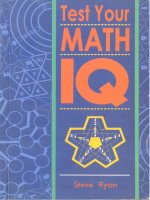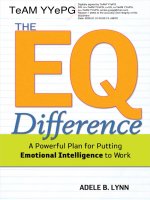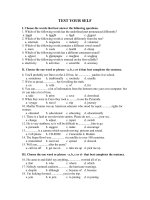test your eq assess your emotional intelligence with 20 personality questionnaires-mantesh
Bạn đang xem bản rút gọn của tài liệu. Xem và tải ngay bản đầy đủ của tài liệu tại đây (11.65 MB, 195 trang )
Kogan Page
120 Pentonville Road
London N1 9JN
United Kingdom
www.koganpage.com
Kogan Page US
525 South 4th Street, #24
1
Philadelphia PA 19147
USA
9 780749 455354
£8.99
US $17.95
Testing
ISBN: 978-0-7494-5535-4
Assess your emotional
intelligence with
22 personality
questionnaires
PHILIP CARTER
TEST
YOUR
EQ
DEVELOP
A HIGH EQ
AND IMPRESS
POTENTIAL EMPLOYERS
Emotional intelligence, more commonly referred to as EQ (emotional quotient) is
the ability to be aware of one’s own emotions and those of other people. The two
main aspects of EQ are understanding yourself and your goals, aspirations,
responses and behaviour, and understanding others and their feelings. In today’s
competitive workplace more and more companies are using EQ tests to vet job
applicants and assess staff. They no longer wish to rely on traditional testing
methods as they recognize that positive behaviours are just as important as
technical expertise.
If you are about to sit such a test Test Your EQ is for you. It will help you to think
about various aspects of your personality, identifying your strengths and
weaknesses. Each test covers a different personality trait followed by an analysis
and assessment. It will help you to:
• prepare for the real tests;
• develop your potential;
• build on your strengths;
• improve on areas of weakness.
There are no right or wrong answers, but practising with the types of question
you may face will calm your nerves and equip you with self-knowledge helping
you to keep one step ahead. T
est Your EQ will also appeal if you just wish to
exercise your mind and analyse your potential.
Philip Carter is an IQ expert who is continually devising new tests and puzzles.
He has produced many books covering all aspects of testing, puzzles and
reasoning. These include Advanced IQ Tests, IQ and Aptitude Tests, IQ and
Personality Tests, IQ and Psychometric Tests, Test and Assess Your Brain Quotient,
and with the late Ken Russell he wrote Succeed at IQ Tests, Test Your IQ, Test and
Assess Your IQ and Ultimate IQ (all published by Kogan Page).
TEST YOUR EQ
PHILIP CARTER
TEST YOUR EQ
Test your EQ AW:Layout 1 26/5/09 11:50 Page 1
i
TEST
YOUR EQ
ii
THIS PAGE HAS INTENTIONALLY
BEEN LEFT BLANK
iii
TEST
YOUR EQ
Assess your emotional intelligence with
22 personality questionnaires
London and Philadelphia
PHILIP CARTER
iv
Whilst the author has made every effort to ensure that the content of this book is accurate,
please note that occasional errors can occur in books of this kind. If you suspect that an
error has been made in any of the tests included in this book, please inform the publishers
at the address printed below so that it can be corrected at the next reprint.
Publisher’s note
Every possible effort has been made to ensure that the information contained in this book
is accurate at the time of going to press, and the publishers and author cannot accept
responsibility for any errors or omissions, however caused. No responsibility for loss or
damage occasioned to any person acting, or refraining from action, as a result of the
material in this publication can be accepted by the editor, the publisher or the author.
First published in Great Britain and the United States in 2009 by Kogan Page Limited
Apart from any fair dealing for the purposes of research or private study, or criticism or
review, as permitted under the Copyright, Designs and Patents Act 1988, this publication
may only be reproduced, stored or transmitted, in any form or by any means, with the prior
permission in writing of the publishers, or in the case of reprographic reproduction in accor-
dance with the terms and licences issued by the CLA. Enquiries concerning reproduction
outside these terms should be sent to the publishers at the undermentioned addresses:
120 Pentonville Road 525 South 4th Street, #241
London N1 9JN Philadelphia PA 19147
United Kingdom USA
www.koganpage.com
© Philip Carter, 2009
The right of Philip Carter to be identified as the author of this work has been asserted by
him in accordance with the Copyright, Designs and Patents Act 1988.
ISBN 978 0 7494 5535 4
British Library Cataloguing-in-Publication Data
A CIP record for this book is available from the British Library.
Library of Congress Cataloging-in-Publication Data
Carter, Philip J.
Test your EQ : assess your emotional intelligence with 22 personality questionnaires /
Philip Carter.
p. cm.
ISBN 978-0-7494-5535-4
1. Emotional intelligence. 2. Personality assessment. 3. Self-evaluation. I Title.
BF576.3.C37 2009
152.4 dc22
2009001274
Typeset by Saxon Graphics Ltd, Derby
Printed and bound in India by Replika Press Pvt Ltd
v
Contents
Introduction 1
1
Strength of character 4
Scoring 9
Assessment 9
2
Success factor 11
Scoring 17
Analysis 17
3
Attitude 19
Assessment 25
4
Social intelligence 27
Assessment 31
5
Content or restless 34
Scoring 40
Analysis 40
6 Extrovert or introvert 43
Scoring 49
Analysis 49
Assessment 51
7 How assertive are you? 53
Scoring 60
Analysis 61
Assessment 62
8 Laterality 64
Assessment 75
9
Optimist or pessimist 76
Assessment 82
10 Aggression 85
Assessment 92
11 Adventurous or timorous 94
Scoring 100
12 How patient are you? 101
Assessment 105
Analysis 105
13 Planned or spontaneous 107
Scoring 112
Assessment 112
14 Self-confidence 114
Assessment 118
Analysis
119
vi Contents
15 Emotional 122
Assessment 125
Analysis 126
16
How well do you cope under pressure? 127
Assessment 133
Analysis 133
17
Tactful or undiplomatic 137
Assessment 142
18
Leadership factor 144
Assessment 148
Analysis 148
19
Tough or tender 151
Assessment 154
20
Open or closed 157
Scoring 162
Assessment 163
21
Do you have the gift of thrift? 165
Assessment 169
Analysis 169
22
How obsessive are you? 171
Scoring 176
Analysis
177
Contents vii
viii
THIS PAGE HAS INTENTIONALLY
BEEN LEFT BLANK
1
Introduction
Your vision will become clear only when you can look into your
own heart. Who looks outside, dreams; who looks inside, awakes.
Carl Jung
Emotional Intelligence (EI), often measured as an Emotional
Intelligence Quotient (EQ), is the ability to be aware of one’s own
emotions and those of other people.
The two main aspects of EQ are:
ᔢ understanding yourself, your goals, aspirations, responses
and behaviour;
ᔢ understanding others and their feelings.
The concept of emotional intelligence was developed in the
mid-1990s by Daniel Goleman, coming to prominence with his
1995 book Emotional Intelligence. The early emotional intelli-
gence theory was originally developed in the United States
during the 1970s and 1980s by the work and writings of
Howard Gardner of Harvard University, Peter Salovy (Yale)
and John Mayer (New Hampshire).
The concept of emotional intelligence means, therefore, having
a self-awareness that enables you to recognize feelings and manage
your own emotions; and it involves self-motivation and being able
to focus on a goal rather than demanding instant fulfilment.
Someone with a high EQ is also capable of understanding the
feelings of others and is better at handling relationships.
In general, the term personality refers to the patterns of
thought, feeling and behaviour that are unique in every one of us,
and these are the characteristics that distinguish us from other
people. Our personality thus implies the predictability of how we
are likely to act or react under different circumstances, although
in reality nothing is quite that simple and our reactions to situa-
tions are never entirely predictable.
Goleman summarized the five EQ domains as:
1. knowing your emotions;
2. managing your emotions;
3. motivating yourself;
4. recognizing and understanding other people’s emotions;
5. managing relationships, ie managing the emotions of others.
It is now widely recognised that if someone is deemed intellec-
tually intelligent it does not necessarily follow they are also
emotionally intelligent, and possessing a high-IQ rating does not
mean that success will automatically follow.
Being intellectually brilliant does not mean that a person is able
to relate to other people socially, nor does it mean they are capable
of managing their own emotions or able to motivate themselves.
The EQ concept argues that IQ, which has tended to be the
traditional measure of intelligence, is too narrow and that there
are wider areas of emotional intelligence, such as behavioural and
character elements, that help dictate how successful we are. It is
because of this that emotional intelligence, in addition to aptitude
testing, is now an important part of recruitment interviewing and
selection procedures.
Although scoring highly in an aptitude test may impress a
prospective employer, it does not reveal the full story, as it does not
automatically follow that the applicant will be suited to the
position for which they are applying. Whilst they may be intellec-
tually qualified to do the actual job, it may be they do not actually
2 Test your EQ
enjoy many aspects of the work involved, or will not fit into a team,
as a result of which they would be very likely to underperform.
Although personality questionnaires are usually referred to as
tests, this can be misleading since they do not have pass or fail
scores. They are sometimes more accurately described as quizzes
and are designed to measure attitudes, habits and values, and are
not usually timed.
The twenty-two personality tests in this book are designed to
assess and analyse a range of aspects of your character and
make-up. There is no requirement to read through these quizzes
before attempting them, just the need to answer them instinc-
tively, and without too much consideration. There is no right or
wrong response.
Whenever you are faced with a personality questionnaire, it is
necessary to answer the questions truthfully. Any attempt to
guess at what you think should be the correct response serves no
purpose and will not result in a true assessment. At all times,
therefore, simply follow the instructions and be honest with
your answers.
The following questionnaires are designed to test different
aspects of your personality. The procedure for completing each of
these is to answer the questions as truthfully and as realistically as
possible, in other words be true to yourself at all times in order to
obtain the most accurate assessment.
Introduction 3
4
Strength of character
A man’s character never changes radically from youth to old age.
What happens is that circumstances bring out characteristics
which had not been obvious to the superficial observer.
Hesketh Pearson
This first test is designed to assess overall strength of character as
opposed to specific character traits.
In each of the following decide whether each word or short
statement applies to you in a positive or negative way and then
place a tick in either the POSITIVE set of boxes or NEGATIVE
set of boxes according to the degree of positivity (5 being the most
positive and 1 the least positive) or negativity (5 being the most
negative and 1 the least negative). You must, therefore, place one
tick in one box only for each of the 20 questions.
If you are unsure of the exact meaning of any of the words, the
use of a dictionary or thesaurus is recommended in order to
obtain the most accurate assessment.
1
Strength of character 5
1.
Persistent
POSITIVE + NEGATIVE –
12345 12345
2.
Determined
POSITIVE + NEGATIVE –
12345 12345
3.
Stubborn
POSITIVE + NEGATIVE –
12345 12345
4.
I believe in making things
happen
POSITIVE + NEGATIVE –
12345 12345
5.
Influential
POSITIVE + NEGATIVE –
12345 12345
6 Test your EQ
6.
Dominant
POSITIVE + NEGATIVE –
12345 12345
7.
Important
POSITIVE + NEGATIVE –
12345 12345
8.
Resolute
POSITIVE + NEGATIVE –
12345 12345
9.
Demanding
POSITIVE + NEGATIVE –
12345 12345
10.
In control
POSITIVE + NEGATIVE –
12345 12345
Strength of character 7
11.
Forceful
POSITIVE + NEGATIVE –
12345 12345
12.
Knowledge is power
POSITIVE + NEGATIVE –
12345 12345
13.
Upbeat
POSITIVE + NEGATIVE –
12345 12345
14.
Emphatic
POSITIVE + NEGATIVE –
12345 12345
15.
Wholehearted
POSITIVE + NEGATIVE –
12345 12345
8 Test your EQ
16.
In charge of my own life
POSITIVE + NEGATIVE –
12345 12345
17.
Adamant
POSITIVE + NEGATIVE –
12345 12345
18.
Tough
POSITIVE + NEGATIVE –
12345 12345
19.
Self-motivated
POSITIVE + NEGATIVE –
12345 12345
20.
Audacious
POSITIVE + NEGATIVE –
12345 12345
Scoring
Add up all the numbers you have ticked in the positive boxes,
and from this total deduct the sum of all the numbers you have
ticked in the negative boxes to obtain your overall strength of
character rating.
Total score above 70 Excessively high strength of character
rating
Total score 55–69 Very high strength of character rating
Total score 40–54 High strength of character rating
Total score 25–39 Above average
Total score 10–24 Average
Total score 0–9 Below average
Total score below 0 Low strength of character rating
Assessment
The original Latin meaning of the word ‘character’ is an
inscription or marking that differentiated one thing from another
for the purposes of identification. Whilst this meaning is still
appropriate in terms of personality, the most common synonyms
now in use are personality, characteristic, attribute or trait.
Every individual possesses a degree of strength of character.
This may manifest itself in many different ways, for example our
strength of character defines our ability to overcome adversity
and realize our ambitions, and determines our capacity to interact
with others, as well as determining how others may perceive us.
Strength of character is, therefore, to possess strong character-
istics that are of value to oneself and to others.
People who have an extremely strong personality are usually
tough, ambitious and assertive. Such people are likely to know
exactly what they want out of life and are not able to rest until
Strength of character 9
they achieve their goals. Whilst many such people are likely to be
a success, one downside of having an excessively strong person-
ality is that they may find difficulty in interacting with others
who may see them, in extreme cases, as over opinionated or
dictatorial. People with a very high strength of character rating
may also become frustrated and unhappy if they do not achieve
their targets.
On the other hand, a less than strong personality may indicate
a lack of confidence and doubt in one’s own abilities, which may
mean that some such people are not exploiting their potential
sufficiently and need to set higher goals.
The advantage of having a balanced strength of character
rating is that such people are likely to be as supportive of others
as they are ambitious for their own aspirations, but there is no
reason why this should prevent them achieving their objectives.
They are as a result likely to be excellent team players and know
what they want out of life, but at the same time are able to accept
life’s inevitable ups as well as the downs.
There is no reason why a strong strength of character cannot
be tempered by an equally strong sense of social justice.
10 Test your EQ
11
Success factor
Answer each question or statement by choosing which one of the
three alternative responses given is most applicable to you.
1. How often do you feel depressed at the thought of returning
to work after a break or holiday?
A Frequently
B Sometimes
C Never
Answer
2. What, generally, is the most important factor to achieving
success in a chosen profession?
A A high IQ
B A high level of academic qualifications
C Persistence
Answer
2
3. How important to you is it that you are a success in your
chosen profession?
A It is not as important as having a steady job that provides
a regular income and security
B I work hard and hope for success, but it is not the be all
and end all
C Very important
Answer
4. Do you think you are somewhat stuck in a rut?
A Maybe, but aren’t most people to a certain extent
B Not really
C No, if I thought I was stuck in a rut I would get myself
out of it
Answer
5. How often do you leave jobs uncompleted?
A The road to nowhere is paved with good intentions and
sometimes it just isn’t worth pursuing a job or project
that you realize it was unwise to have started in the first
place
B Occasionally, as I like moving onto other things and
often have several projects on the go at the same time
C Very rarely, if ever
Answer
6. How difficult is it for you to focus on one thing at a time?
A Quite difficult
B Sometimes difficult
C Not at all difficult
Answer
12 Test your EQ
7. Do you believe that you get out of life as much as you put in?
A Not really – life is not as simple as that
B Sometimes – life has its ups and downs
CYes
Answer
8. How necessary is the help and cooperation of others in order
to achieve a high level of success?
A Not very important as there are many very successful
self-made men
B Quite important
C Very important
Answer
9. Do you feel you are getting mentally stronger as time goes by?
A Not particularly
B I believe so
C Yes, in many respects
Answer
10. Which of the following is of the most importance to you:
being motivated by your own inner beliefs and aspirations or
being motivated by your desire to succeed?
A Being motivated by my own inner beliefs and aspirations
B Being motivated by my desire to succeed
C Both of equal importance
Answer
Success factor 13
11. Are you constantly on the lookout for new opportunities to
grasp?
A Not constantly, but it is always nice when a new oppor-
tunity presents itself
B Usually I am too busy with what I am doing, but occa-
sionally I have benefited from new opportunities that
have come my way
CYes
Answer
12. Which of the following words best describes you?
A Well-liked
B Hard-working
C Tenacious
Answer
13. What do you think is the secret of success?
A Being in the right place at the right time
B Working hard in your chosen profession
C There is no one secret of success as many different factors
are involved
Answer
14. How often do you set yourself goals?
A Rarely if ever
B Occasionally
C Frequently
Answer
15. What is your attitude to change?
A It is inevitable
B It can present a new challenge
C It can present new opportunities
Answer
14 Test your EQ
16. Would you give up your favourite hobby completely if it
meant success in your chosen career?
A The circumstances would have to be very exceptional
before I would consider doing so – surely doing some-
thing you enjoy is the most important thing in life
B I’m not sure
C Yes, if it was absolutely necessary
Answer
17. Do you enjoy the career/job you are doing?
A Not particularly
B Sometimes
CYes
Answer
18. How important is the power of hindsight?
A Not very important as you can’t turn back the clock
B Sometimes it is interesting to look back and analyse;
however, anyone can be a genius and a success with the
power of hindsight
C Very important
Answer
19. If you knew then what you know now would you have
chosen a different career?
AYes
B Maybe there are things I would have done differently if I
had known then what I know now
C No, I am happy with the way things have turned out
Answer
Success factor 15
20. How easy is it for you to abandon good intentions?
A Sometimes it is prudent to cut and run
B Not easy, but sometimes it is necessary
C I don’t believe in abandoning good intentions
Answer
21. Do you get on well with the majority of people that you come
into contact with?
A Some people are impossible to get on well with
B Not always
C Yes, I would say so
Answer
22. Which of the following words best describes you?
A happy
B astute
C energetic
Answer
23. Which of the following most accurately describes you?
A I can turn my hand to most things
B A specialist in my chosen profession
C Someone who believes that a job worth doing is worth
doing well
Answer
24. It is necessary to make enemies in order to achieve success.
A No, I don’t take the view that it is necessary
B I’m not sure it is necessary, although in certain circum-
stances some people could be jealous of another person’s
success
C Yes, unfortunately
Answer
16 Test your EQ









